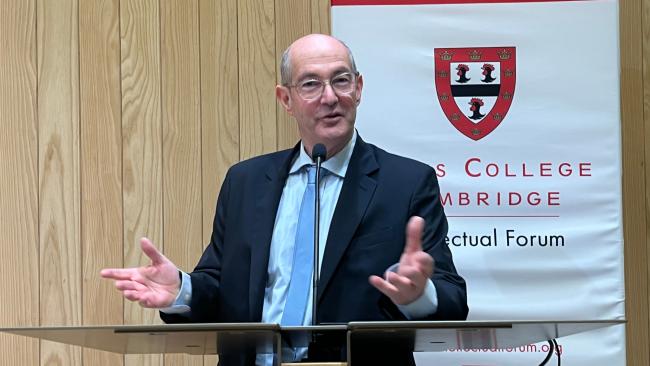The Madman in the White House
Has there been a madman in the White House? At a talk at the Intellectual Forum on 30 April, historian Patrick Weil considered the question.
ŌĆ£One of the first events that we ran was timed to fit in with the inauguration of President Trump", said IF Director Julian Huppert during his introduction to the evening. ŌĆ£That is not the subject of tonightŌĆÖs talkŌĆØ.
Instead, historian Patrick Weil considered the psyche of Woodrow Wilson, President of the United States from 1913 until 1921 and often considered the reason that the US failed to ratify the Treaty of Versailles in 1919.
While analysis of the mental state of American Presidents has become commonplace in recent years, the psychobiography on which Weil based both his book and his talk at the IF was the first attempt to apply psychoanalytic theory to a political leader. Alarmed by Wilson's handling of the Treaty of Versailles, and concerned about how a political leaderŌĆÖs mental state might have altered the course of history, Bullitt set out to write a psychological analysis of the president.
To do so, he recruited the help of Sigmund Freud, the father of psychoanalysis, and together they wrote a manuscript based on interviews with members of WilsonŌĆÖs inner circle, including his doctor, his secretary, and his most intimate advisers.
After two years of collaboration, Bullitt and Freud signed off on a manuscript in April 1932. But the book was not published until 1966, after the deaths of both Wilson in 1939 and his wife in 1962, and the published version was heavily edited and redacted. For decades, Bullitt and FreudŌĆÖs 1932 manuscript was considered lost.
Weil rediscovered the original manuscript ŌĆō with each chapter signed by the two authors ŌĆō in the Yale University archives in 2014. Upon comparing the published version with the original manuscript, Weil found over 300 amendments. His talk, based on this manuscript and he published about his discovery, was a wide-ranging consideration of some of BullittŌĆÖs ŌĆ£evidenceŌĆØ for his analysis of Wilson. It considered not only the events surrounding the Treaty of Versailles, but also WilsonŌĆÖs time at Princeton, when his reformation of the University turned some of his friends against him ŌĆō a betrayal that stayed with Wilson throughout the rest of his life.
Weil did not completely agree with analysis in BullittŌĆÖs and FreudŌĆÖs book and felt that, at points, the authors went too far in attributing everything in WilsonŌĆÖs life to his deteriorating mental health. But as an intimate portrait of Wilson, the manuscript, and WeilŌĆÖs interpretation of it, provides the basis for a powerful reassessment of 20th-century American diplomacy and of how the mental health of a controversial American president shaped world events.





